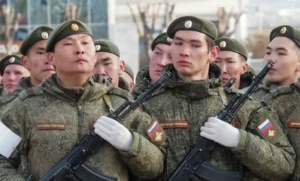Russia is a prison of nations and Buryatia is an inmate

Russia’s so-called “republics” are republics in name, but colonies in function. From Buryatia’s mountains and pine-covered steppes, the wealth flows one way—toward Moscow. Timber, coal, copper, rare earth metals—extracted with industrial hunger, shipped out to feed the war machine or line the pockets of the elite. What remains is the silence of abandonment: hollow towns, shuttered clinics, soldiers’ funerals.
Buryatia is among the most exploited. And among the most sacrificed.
Though resource-rich, the region lives in poverty. It ranks near the bottom of the Russian Federation in income, infrastructure, and life expectancy. Yet it ranks near the top in military deaths per capita in Ukraine. This is no coincidence—it is a method. When wealth is denied and futures are stunted, the offer of a rifle becomes a form of social policy.
This design of domination is not new. It has the dust of centuries upon it.
By the 1640s, Cossacks had penetrated Buryat lands. By the 1680s, resistance was spent. The Treaty of Nerchinsk (1689) made it official: the Buryats, once sovereign in spirit and space, were now subjects.
Moscow did not conquer to share. It conquered to absorb.
Traditional grazing lands were seized or partitioned.
Buddhist lamas were replaced by Orthodox priests.
Schools no longer taught the world, only Russia.
Buryats were to forget they were Buryats.

When the empire gave way to the Soviets, repression did not vanish—it matured. Under Stalin, entire temples were razed. Monks disappeared. The Buryat-Mongol Republic—a name that once hinted at wider kinship—was truncated to diminish even memory. Collectivization destroyed what little was left of nomadic autonomy.
The economic model was brutally clear: extract from the periphery, enrich the center. And when wars came, conscript from the periphery, protect the center.
The war in Ukraine has exposed this system in all its brutal clarity. Buryatia’s young men have been sent to die in a war not of their making. Recruiters offered bonuses, promises, escape. What they delivered were coffins.
This is the logic of empire, and of Russia in particular—a state that calls itself a federation but functions as a prison of nations, where dozens of indigenous peoples are held within borders they never drew, serving masters they never chose.